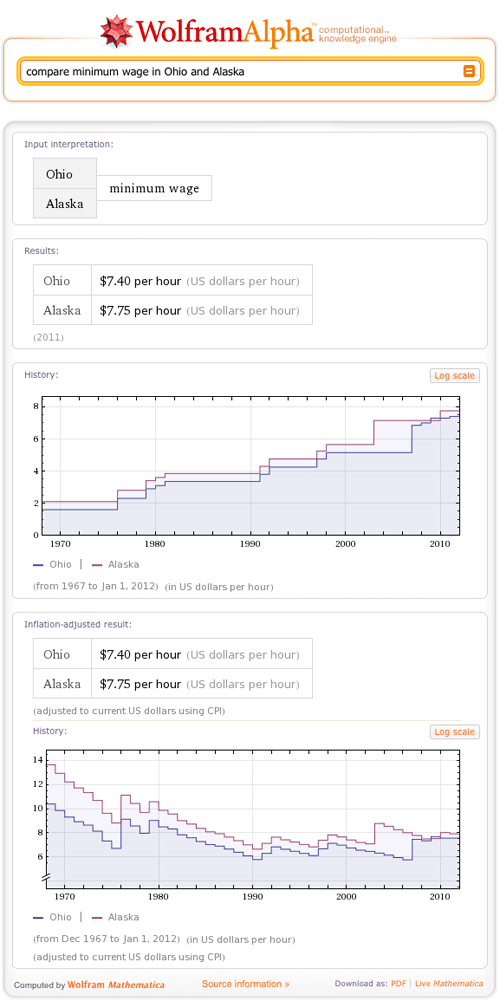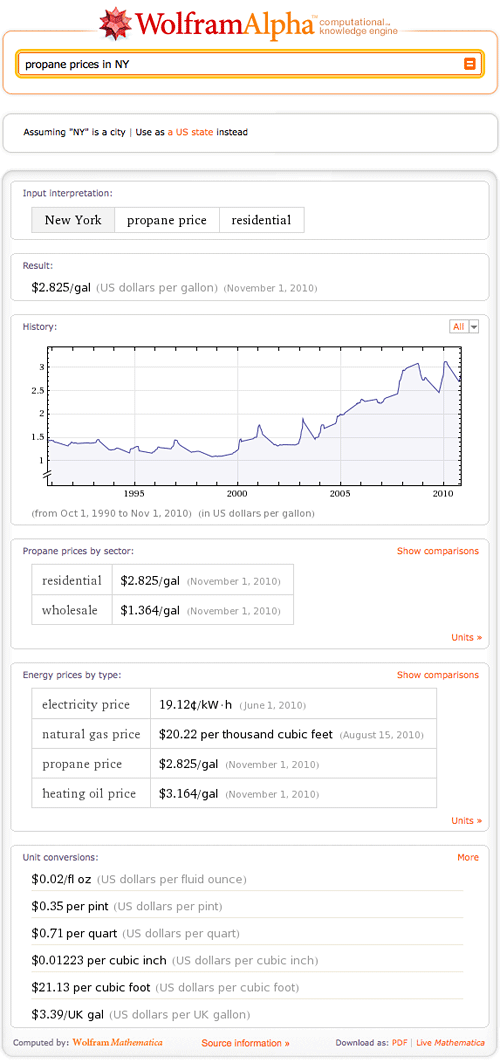 5
5
Last year, we showed you how Wolfram|Alpha could help you explore some interesting historical statistics about federal income taxes in the United States. We’ve picked up the latest available figures from the Internal Revenue Service (IRS) through the 2008 tax year, so you can revisit that data and see if previous years’ trends have held up.
Wolfram|Alpha still can’t do your taxes (and if you haven’t finished them yet, don’t forget you’ve got until Monday to file)… but it can compute some very interesting new facts about income taxes in the US. There’s been a lot of discussion and debate this year about state-level corporate and individual taxes and their impact on budgets and the overall business climate in any given state. So we’ve added data on the maximum and minimum individual and corporate tax rates in each US state, which means Wolfram|Alpha can now compute rankings and summary statistics about “income tax rates in US states” or perform a comparison of the “highest corporate income tax rates in Illinois, Iowa, and Indiana”.
 4
4
Wolfram|Alpha recently added information about the minimum wage in U.S. states (from 1967 through today) based on data from the U.S. Department of Labor. This means you can ask Wolfram|Alpha about simple historical facts, like the U.S. minimum wage in 1980, or perform simple analyses, like comparing the current minimum wage in Ohio and Alaska.
 8
8
As temperatures start falling across the U.S., many of us are looking more closely at our home heating and energy bills, wondering how much they might go up this winter. Wolfram|Alpha can’t yet predict the future, but now it can help you explore historical and recent energy-price trends in most U.S. states, thanks to data from the U.S. Energy Information Administration (EIA).
Ask Wolfram|Alpha about “heating oil prices in New York”, for example, and you’ll see that as of November 1, the statewide average price was about $3 per gallon—slightly higher than at the start of last winter, but quite a bit below the peak in late winter of 2008. Propane prices are also higher than a year ago, and you can also see that prices climbed dramatically over the course of last winter. You can keep checking back over the course of the season to see which way prices are trending in your state.
(Note that the jagged appearance of heating oil and propane plots is due to the fact that prices are only reported for part of the year; these prices are also reported for only about 20, mostly northern, U.S. states.)
You can also ask Wolfram|Alpha about natural gas and electricity prices. The EIA keeps these figures less up to date than figures for heating oil and propane, but you can clearly see long-term price trends and seasonal fluctuations for both of them. More »
 2
2
Happy birthday, George Washington! In case you’d forgotten, President’s Day in the United States isn’t actually celebrated on George Washington’s birthday: since 1971, it has fallen on the 3rd Monday in February, which means it’s always at least one day short of the first president’s actual birthday, February 22.
As you might imagine for a man referred to as “the father of the country,” the name “Washington” has taken on a life of its own—and as such, it provides a good opportunity to see how Wolfram|Alpha deals with cases where a single word can be interpreted in many different ways.
Type “Washington” on its own, and you’ll learn that the word could refer to a city, a U.S. state, a surname, a specific person, or a given name. For users in the United States, Wolfram|Alpha will assume you’re talking about the nation’s capital, and then give a list of alternate cities ranked by a combination of population, distance from your current location, and general popularity. But if you’re in the United Kingdom, the default assumption will be a place closer to home:

When you ask more-specific questions about “Washington”, Wolfram|Alpha is usually able to make even-more-intelligent assumptions about which Washington you really want know about. Ask for “distance from seattle to washington” and you’ll get the great-circle distance between two cities. Try to “compare virginia and washington“, and you’ll get a stat-by-stat comparison of the two U.S. states. Ask Wolfram|Alpha “when was Washington born?” and the result is the first U.S. president’s birthday; try “washingtons in 1900” and you’ll discover that about 28 U.S. residents were given that first name that year, or ask about “washington as a last name” and Wolfram|Alpha will reveal that more than 160,000 people had that last name in the 2000 U.S. Census. More »
 44
44
Soon everyone will have access to the first version of Wolfram|Alpha. Already some have asked: “What kinds of questions can Wolfram|Alpha help me answer?” “Will there be examples for me to use?” “How will I get started?”
As we make our final preparations to release Wolfram|Alpha over the next week, we thought it might be helpful to discuss questions like these in this blog.
Looking at the Examples by Topic page provides a good framework. You will be able to navigate from the Wolfram|Alpha home page to Examples:
More »




